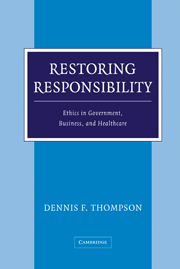Book contents
- Frontmatter
- Contents
- Acknowledgments
- Restoring Responsibility
- Introduction: The Need for Institutional Responsibility
- PART I DEMANDS OF INSTITUTIONAL POLITICS
- 1 The Problem of Many Hands
- 2 The Responsibility of Advisers
- 3 Bureaucracy and Democracy
- 4 Judicial Responsibility
- 5 Representatives in the Welfare State
- PART II VARIETIES OF INSTITUTIONAL FAILURE
- Part III EXTENSIONS OF INSTITUTIONAL RESPONSIBILITY
- Credits
- Index
3 - Bureaucracy and Democracy
Published online by Cambridge University Press: 29 January 2010
- Frontmatter
- Contents
- Acknowledgments
- Restoring Responsibility
- Introduction: The Need for Institutional Responsibility
- PART I DEMANDS OF INSTITUTIONAL POLITICS
- 1 The Problem of Many Hands
- 2 The Responsibility of Advisers
- 3 Bureaucracy and Democracy
- 4 Judicial Responsibility
- 5 Representatives in the Welfare State
- PART II VARIETIES OF INSTITUTIONAL FAILURE
- Part III EXTENSIONS OF INSTITUTIONAL RESPONSIBILITY
- Credits
- Index
Summary
Democracy does not suffer bureaucracy gladly. Many of the values we associate with democracy – equality, participation and individuality – stand sharply opposed to the hierarchy, specialization, and impersonality we ascribe to modern bureaucracy. Yet for a long time political theorists did not see bureaucracy as a threat to democracy, and democratic theorists still have not formulated a satisfactory response to the challenge bureaucratic power poses to democratic government. One response to this challenge denies bureaucracy any place at all in a genuine democracy. Theorists who take this approach usually realize that they must show that bureaucracy does not inevitably appear in every modern society, but only in those societies they consider non democratic. Thus, nineteenth-century British writers often referred to bureaucracy as the “Continental nuisance,” from which their democracy was immune. Marx and other socialist writers agreed that France and Germany had the most highly developed bureaucracies, but they insisted that, as merely one manifestation of the bourgeois state, bureaucracy would disappear with the capitalism that gave rise to that state. Yet socialist societies (admittedly not yet the democracies Marx had in mind) turned out to be more bureaucratic than the governments they replaced. Similarly, the belief that bureaucracy inheres in only socialist government could hardly be sustained once capitalist societies created the administrative structures necessary to maintain their large welfare states.
Still, from time to time, voices on both the left and the right revive the hope that bureaucracy might be abolished. Many have called for decentralization to eradicate bureaucracy. But smaller political
- Type
- Chapter
- Information
- Restoring ResponsibilityEthics in Government, Business, and Healthcare, pp. 50 - 70Publisher: Cambridge University PressPrint publication year: 2004
- 1
- Cited by



